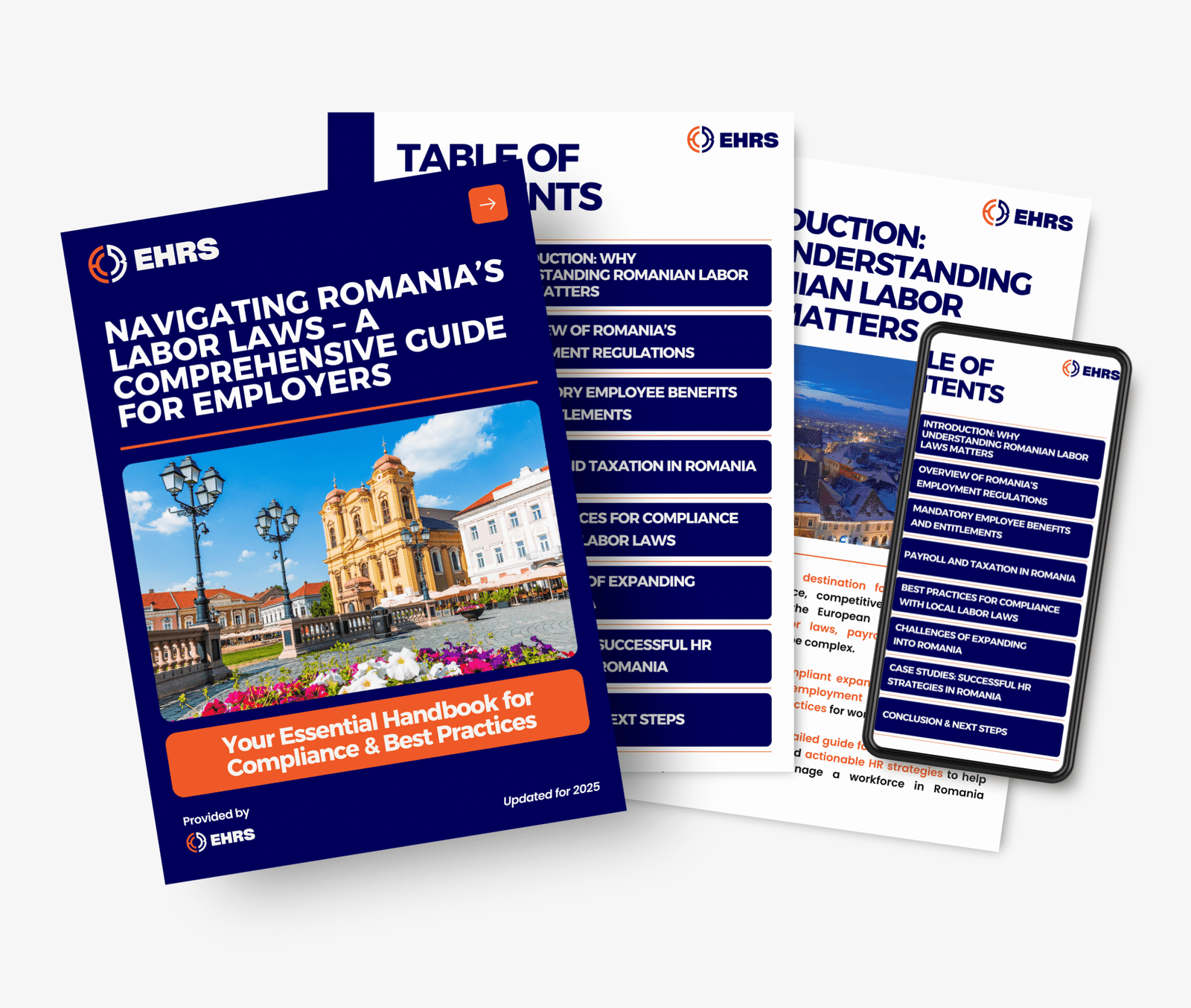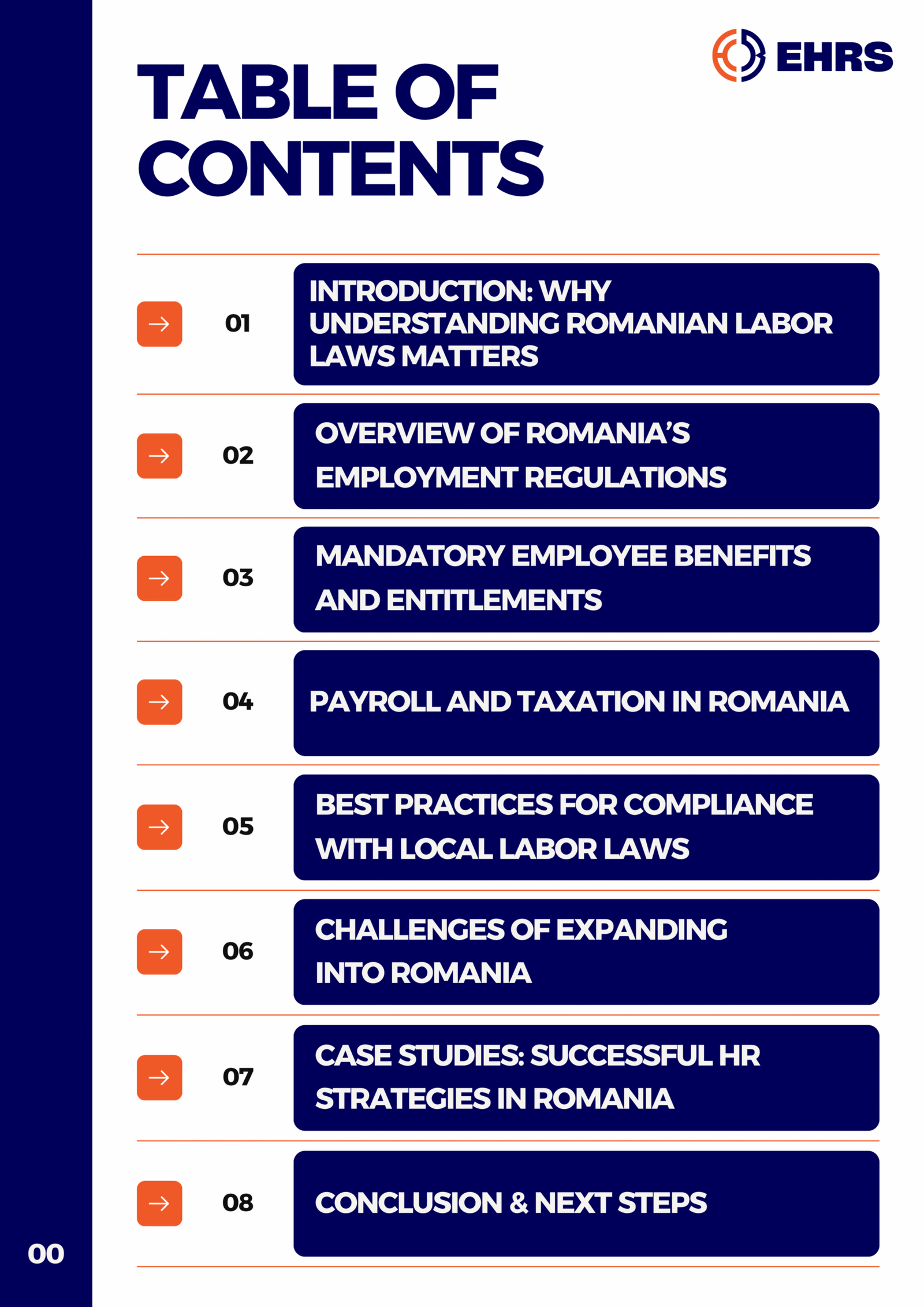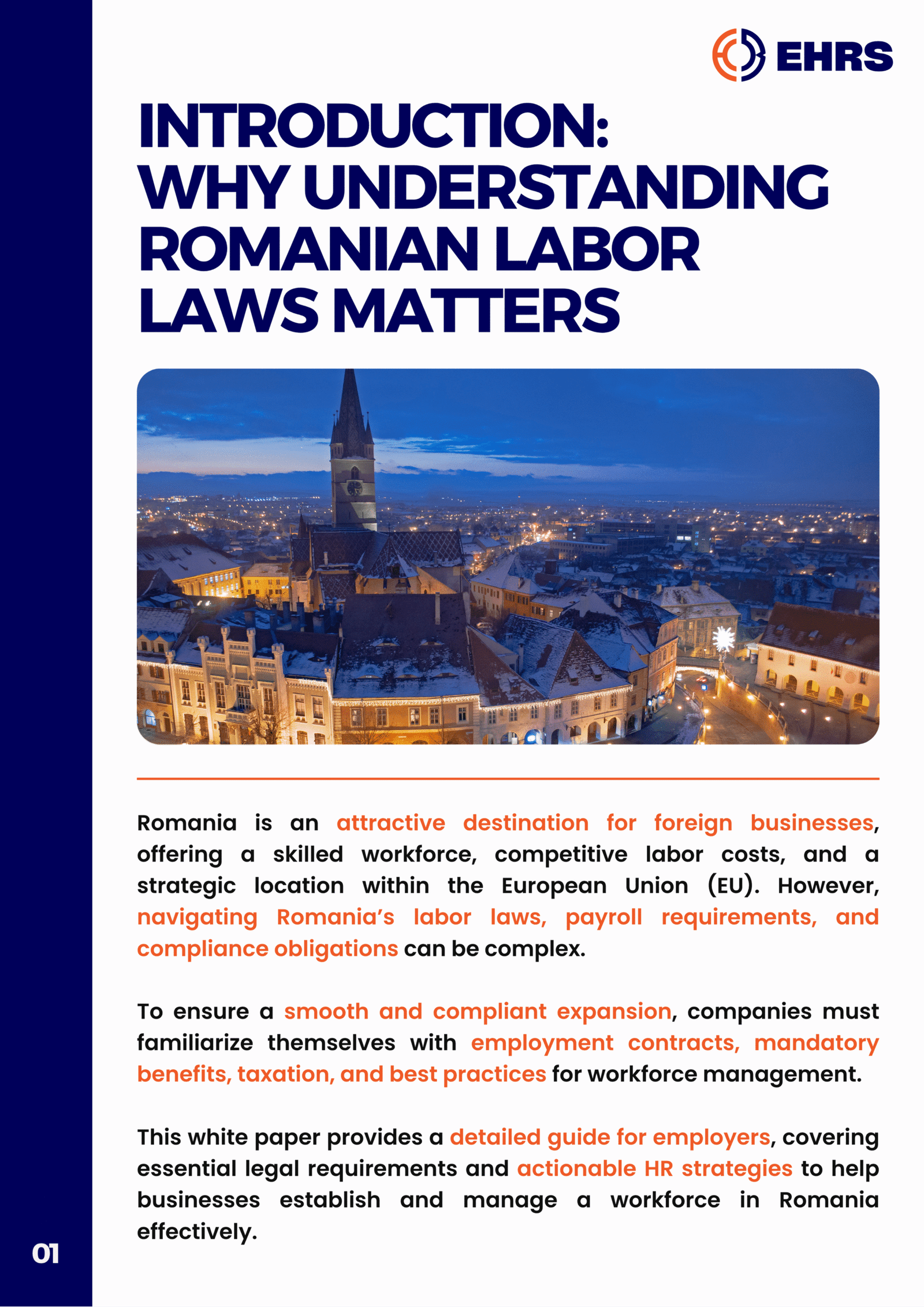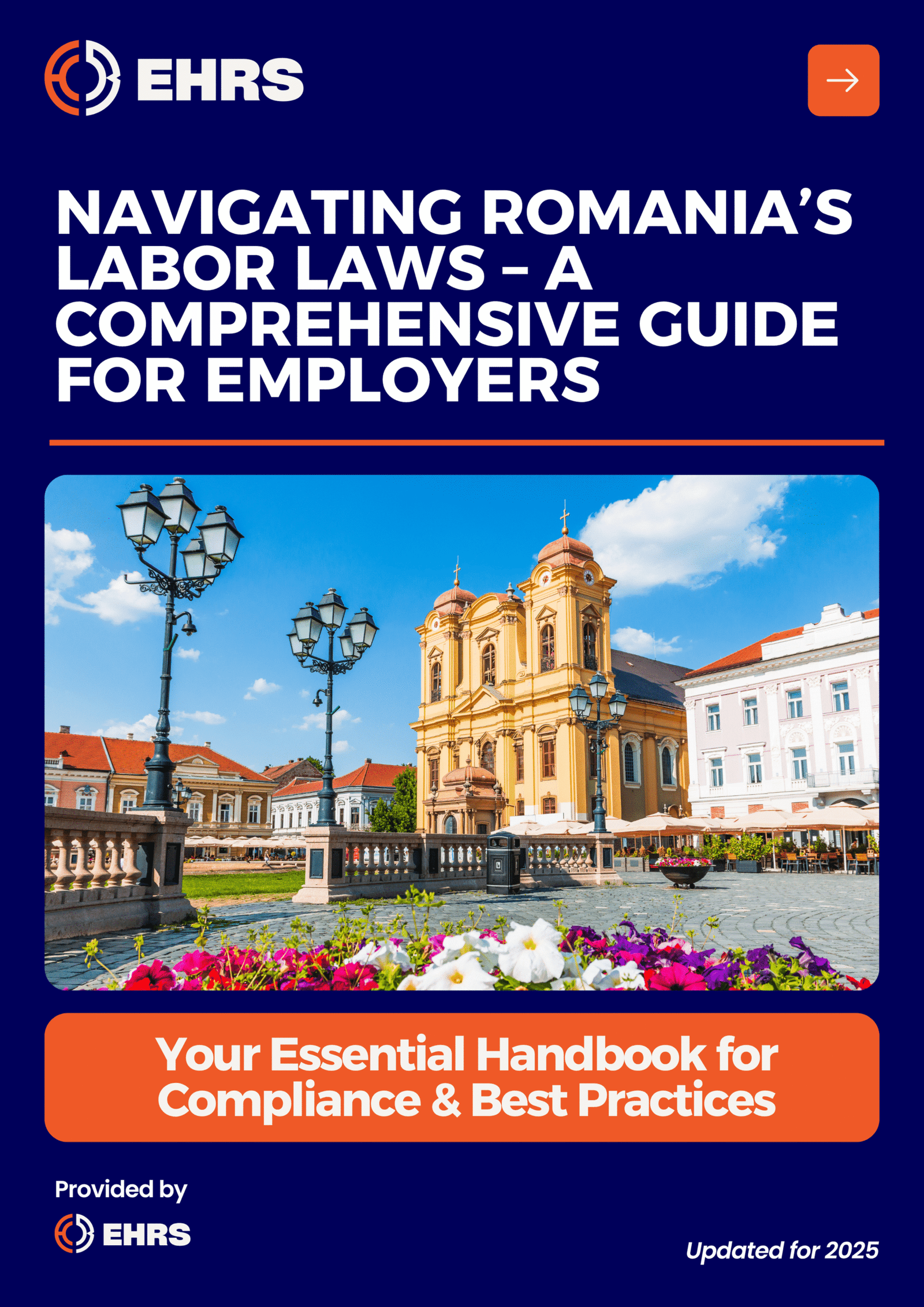ROMANIA
List of countries
HR Services for Romania
Europe HR Solutions provides comprehensive HR services for Romania, helping businesses manage payroll, compliance, recruitment, and employee administration with ease. Our expertise ensures your HR processes remain compliant with Romanian labor laws while supporting your company’s growth.
According to the U.S. Department of State, Romania continues to position itself as a competitive and fast-growing economy in Eastern Europe. As an EU member with a strategic location, cost-effective workforce, and strong industrial base, Romania attracts U.S. and global investors across key sectors including IT, manufacturing, automotive, and energy. The Romanian government has made efforts to improve infrastructure, digitize public services, and streamline business processes—enhancing the overall investment climate. American companies play a growing role in the country’s development, supporting jobs and innovation in multiple regions.
However, HR operations in Romania can pose challenges for U.S. and UK companies unfamiliar with the local labor code, collective bargaining agreements, and evolving tax and social security rules. Employment contracts must adhere to strict national standards, including mandatory clauses on work time, notice periods, and employee protections. Companies must also comply with detailed reporting requirements, payroll taxes, and employee benefit obligations. Without local expertise, building an in-house HR function may lead to delays and compliance risks. By outsourcing HR to a trusted partner like EHRS, companies can accelerate their Romanian market entry, ensuring that contracts, payroll, and compliance processes are fully aligned with Romanian and EU labor law—supported by local knowledge and operational precision.
ALL YOU NEED TO KNOW ABOUT
HR OUTSOURCING IN ROMANIA
ROMANIAN EMPLOYMENT
REGULATIONS TO KNOW
THE BENEFITS OF
EXPANSION IN ROMANIA
THE CHALLENGES OF
EXPANSION IN ROMANIA

Check our free HR guide to help you quickly improve your HR in Romania
FAQ for Romania
Learn more about Romania
Free Download
Request your free guide and receive it immediately

All You Need to Know About Outsourcing
Your HR in Romania with EHRS
Comprehensive HR Outsourcing Support
EHRS provides full-service HR services for Romania, managing employment contracts, payroll, onboarding, leave administration, and compliance with national labor laws. Our local experts ensure your HR operations are set up efficiently and correctly—so you can focus on expanding your business.
Expert Navigation of Romanian Labor Law
Romania’s labor legislation includes strict requirements around contract types, probation, working time, severance, and tax compliance. EHRS helps you navigate these legal obligations while staying aligned with both national and EU frameworks—reducing your risk of penalties or delays.
Scalable and Efficient HR Solutions
Whether you’re entering the Romanian market through Bucharest, Cluj, or a regional operations hub, EHRS offers scalable HR solutions that adapt to your growth. We support startups, international expansions, and operational teams seeking HR clarity and compliance.
Romanian Employment Regulations to Know
Employment Contracts
Written employment contracts are mandatory in Romania and must be signed before the employee begins work. These contracts must clearly outline job responsibilities, compensation, working hours, and probation (if applicable), and must be registered in the national REVISAL system. Our HR services for Romania ensure all contracts are compliant and properly filed to avoid legal or administrative risks.
Working Hours & Paid Leave
The legal workweek in Romania is typically 40 hours. Employees are entitled to a minimum of 20 working days of paid annual leave, and employers must also observe public holidays. Working time, overtime, and rest periods are governed by the Romanian Labor Code.
Social Security & Tax Contributions
Employers are responsible for registering employees with the National Tax Authority (ANAF) and contributing to the national social security system, which covers pensions, health, and unemployment insurance. Payroll must be reported and filed digitally on a monthly basis.
The Benefits of Expansion in Romania
Strategic EU Location with Cost Advantages
Romania offers direct access to the EU single market and serves as a gateway to Central and Southeastern Europe. Its labor and operational costs remain among the lowest in the EU, making it an attractive base for nearshoring and regional expansion.
Skilled, Multilingual Workforce
Romania is known for its highly educated and multilingual workforce, particularly in fields like IT, engineering, finance, and customer service. English proficiency is high among young professionals, especially in major urban areas.
Growing Tech and Innovation Ecosystem
With growing support for innovation and digitization, Romania is becoming a popular destination for shared service centers, R&D hubs, and startups. Government incentives for foreign investors further enhance its business appeal.
The Challenges of Expansion in Romania
Complex and Evolving Labor Regulations
Romanian labor laws are regularly updated and can be strict on issues such as fixed-term contracts, dismissals, and employee protections. Navigating this complexity without local guidance can lead to costly errors.
Bureaucracy and Administrative Load
Although improving, Romania’s employment and tax procedures can still be paperwork-heavy. Registrations, REVISAL filings, and payroll declarations require strict accuracy and timeliness to avoid fines.
Local Language and Legal Documentation
All employment contracts and legal filings must be in Romanian. To remain compliant and avoid legal misunderstandings, translation and expert local support are essential when entering the market.
Talk to an HR specialist about payroll, compliance, and audits today.
Expand into Romania with confidence.
Most Asked Questions
About Romania
Why do I need a written employment contract in Romania? Aren’t verbal agreements valid?
Romanian labor law mandates written employment contracts for all employees, specifying key terms like salary, job duties, and working hours. Verbal agreements are not valid and could lead to fines or disputes.
Why It’s Risk-Free: We draft legally compliant employment contracts that protect your business and ensure clear expectations for employees.
Do I really need to track working hours in Romania? Isn’t flexibility more practical?
Romanian labor law requires employers to track working hours and comply with the standard 40-hour workweek. Accurate records protect against disputes and ensure compliance with overtime regulations.
Why It’s Risk-Free: We help you implement reliable time-tracking systems, ensuring compliance while allowing for workplace flexibility.
How much annual leave do I need to provide? Isn’t the statutory minimum sufficient?
Employees in Romania are entitled to at least 20 working days of paid annual leave, with additional days for specific roles or tenure. Offering only the minimum may affect retention.
Why It’s Risk-Free: We design competitive leave policies that meet legal standards while supporting employee satisfaction and retention.
Parental leave in Romania seems long. How can I maintain productivity during employee absences?
Romanian labor law provides up to 2 years of parental leave per child (3 years for children with disabilities), paid by social insurance. Workforce planning and temporary hires can mitigate operational disruptions.
Why It’s Risk-Free: We assist with parental leave planning and compliance, ensuring your operations remain stable while supporting employees.
Are collective agreements (CAs) mandatory in Romania? Can’t I create my own policies?
Collective agreements are required for businesses with 21 or more employees and regulate wages, benefits, and working conditions. Ignoring applicable agreements can result in penalties or disputes.
Why It’s Risk-Free: We ensure compliance with mandatory collective agreements and align your policies with Romanian labor standards.
How do payroll taxes work in Romania? What happens if I make a mistake?
Employers are responsible for deducting income tax, social security contributions, and health insurance from employees’ salaries. Errors can result in audits or penalties from tax authorities.
Why It’s Risk-Free: We manage payroll compliance, ensuring accurate deductions and timely filings with Romanian authorities.
Do I need to focus on health and safety in Romania? Isn’t this just common sense?
Employers in Romania are required to implement health and safety measures, including risk assessments and training. Non-compliance can result in penalties or workplace accidents.
Why It’s Risk-Free: We provide comprehensive health and safety solutions, ensuring compliance and protecting your employees.
Is compliance worth the cost? Won’t it just increase my overheads?
The cost of non-compliance—fines, lawsuits, and employee turnover—far outweighs the investment in proactive compliance. It also enhances trust and operational stability.
Why It’s Risk-Free: We streamline compliance processes, saving you time and money while ensuring smooth operations.
Are probation periods necessary? Can’t I just terminate employees who don’t perform?
Probation periods in Romania allow for easier termination during the trial phase, limited to 90 days for regular employees and 120 days for managerial roles. Without a probation period, terminations are subject to stricter rules.
Why It’s Risk-Free: We structure probation clauses that comply with Romanian labor laws, giving you flexibility and reducing legal risks.
Is overtime pay mandatory? Can’t I just offer time off instead?
Overtime in Romania must be compensated with a 75% pay premium or substituted with equivalent time off within 60 days. Non-compliance can lead to fines or employee claims.
Why It’s Risk-Free: We design compliant overtime policies that ensure fairness and protect your business from disputes.
Do I need to pay employees during sick leave? Isn’t this covered by social insurance?
Employers are responsible for paying the first 5 days of sick leave at 75% of the employee’s average salary. After that, costs are covered by the National Health Insurance Fund.
Why It’s Risk-Free: We handle sick leave documentation and compliance, reducing your administrative burden while ensuring accuracy.
Termination laws in Romania sound restrictive. What if I need to reduce staff quickly?
Terminations must follow Romanian labor law, requiring valid reasons, notice periods, and in some cases, severance payments. Non-compliance can lead to fines or legal claims.
Why It’s Risk-Free: We guide you through lawful termination processes, protecting your business and minimizing legal risks.
Are pensions mandatory in Romania? Isn’t salary enough to retain employees?
Employers must contribute to the national pension system through social security. Additional private pensions can be offered as an employee benefit.
Why It’s Risk-Free: We ensure pension contributions are compliant and help design benefit packages that support retention and competitiveness.
Can I hire non-EU workers in Romania? Isn’t the process too complicated?
Non-EU workers require a work permit, residence permit, and labor market test. Employers must prove that no local or EU candidate can fill the role. Delays or errors can disrupt hiring timelines.
Why It’s Risk-Free: We handle the permit application process, ensuring compliance and smooth onboarding for international hires.
What happens if I fail a compliance audit in Romania? Could it disrupt my operations?
Non-compliance with Romanian labor laws can result in financial penalties, reputational damage, or operational restrictions. Audits often focus on payroll, contracts, and workplace safety.
Why It’s Risk-Free: We proactively review your HR policies, ensuring compliance and audit readiness to keep your business running smoothly.



